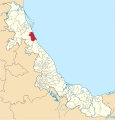Mexicans Hold North Korean Freighter Over UN Weapons Sanctions

April 28, 2015
TUXPAN, Mexico — The cargo holds were empty and the 430-foot-long North Korean freighter Mu Du Bong was riding high in the water when the vessel slammed into a coral reef in Mexican waters in the Gulf of Mexico last July 14, thudding to a halt.
The freighter did more than tear up staghorn and elkhorn coral. It also crashed into U.N. sanctions that have trapped it in the hands of the Mexican government.
Salvage vessels pulled the freighter off the reef 12 days later and brought it to port in Tuxpan, where it’s been idle for nine months, moored to a wharf on the Tuxpan River. North Korea has declined to repatriate the 33 crew members, and they occasionally can be seen fishing off the freighter’s deck.
Earlier this month, North Korea’s deputy representative to the United Nations made some slightly menacing remarks demanding that Mexico terminate what he called a “complete abnormal situation.”
“We will take necessary measures to make the ship leave immediately,” envoy An Myong Hun said at a news conference April 8 in New York.
It’s an odd standoff in a corner of the world far from North Korea and the chambers of the U.N., where diplomats knowingly mention 1718, 1874 and 2094, the Security Council resolutions aimed at shutting down North Korea’s nuclear program and reining in its weapons proliferation efforts.
It was those arms-trafficking practices that led the U.N. Security Council to impose sanctions on a North Korean concern, Ocean Maritime Management Co. Ltd., that counts the Mu Du Bong among its 14 oceangoing freighters.
Another of the company’s vessels was intercepted in Panama nearly two years ago, its cargo holds piled high with sacks of Cuban sugar. When inspectors removed the sacks, they discovered two MiG-21 fighter jets, 15 jet engines and radar control systems for missile launches. The freighter, the Chong Chon Gang, had left Cuba bound for North Korea and was about to transit the Panama Canal when Panamanian inspectors boarded it. Cuba claimed the war materiel was being sent to North Korea to be refurbished and was to be returned.
The harbormaster at the Port of Tuxpan, Alberto Orozco Peredo, said the captain of the Mu Du Bong had a far humbler mission than smuggling weaponry.
“He was coming for fertilizer,” Orozco said, adding that the freighter had been chartered in Cuba for a single excursion to Tuxpan to pick up the shipment and return to the island. “Maybe they (the North Koreans) offered to do the shipping for cheap.”
Orozco said he’d accompanied members of a U.N. Security Council sanctions committee when they inspected the moored ship. He said they’d found nothing.
“For a 30-year-old ship, it was in a good state of repair. You can see that it’s clean,” Orozco said. “The vessel complies with all security standards.”
The crew members have shore passes but rarely leave the vessel. When six months had passed, their temporary visas expired. In recent days, immigration officials have begun the work of granting them indefinite humanitarian visas.
While North Korea can’t dislodge its ship, the reason it keeps all the crew members in Mexico is unclear.
“From day one, they have been free to move wherever they want to go, within or outside Mexico,” Ricardo Alday, political coordinator of Mexico’s mission to the U.N., said in an email.
A local shipping agency, Tajin Consignaciones, arranges through the North Korean embassy in Mexico City to provide food to the crew. Agency director Maria de los Angeles Monsivais declined to speak to a reporter.
The U.N. Security Council hit Ocean Maritime Management with sanctions last July, and the company scrambled to keep its ships on the high seas without seizure, often with their maritime transponders turned off.
“Thus far, 13 of the 14 vessels controlled by OMM have been renamed, their ownership transferred to other single ship-owner companies … and vessel management transferred to two main companies,” said a preliminary U.N. report dated Feb. 23.
The freezing of the Mu Du Bong has put Mexico in a tough position.
“There is no set procedure for what to do once they seize the ship,” said Jeffrey Lewis, director of the East Asia Nonproliferation Program at the Center for Nonproliferation Studies, part of the Monterey Institute of International Studies in California.
Some experts think that going after North Korean freighters engaged in ordinary trade is only likely to drive Pyongyang away from any negotiations.
“That’s a misguided effort. People have to make a distinction between things that are prohibited and normal commercial activity,” said John Merrill, a former chief of the Northeast Asia division of the State Department’s Bureau of Intelligence and Research. “It seems a little bit ridiculous to keep holding these guys, and it’s going to have consequences.”
Others disagree, saying economic pressure on North Korea is the only way to get its attention and force concessions.
“The purpose of the sanctions is to buy time for diplomacy. If the sanctions are not being enforced, then there’s no pressure at all on North Korea,” said William J. Newcomb, a visiting scholar at the School of Advanced International Studies at Johns Hopkins University who’s a former member of the U.N. Security Council’s panel of experts on North Korea sanctions.
Newcomb noted that the Mu Du Bong’s travels were similar to the activities of the Chong Chon Gang before it was caught carrying Cuban weapons.
“It had all the earmarks of an arms transfer,” he said.
Mexico reportedly was about to free the ship late last year, but An, the North Korean envoy, said the nation had received a warning from a senior U.N. official.
“Suddenly, the Mexico government revoked its position. They said they have received advice from an unnamed undersecretary-general of the United Nations for the continued detention of the ship,” An told reporters.
Now, Mexico’s posture is that the ship will be retained indefinitely.
“The ship will be held (as long as) the company that owns it remains under U.N. sanctions,” Alday wrote in his statement, noting that Mexico “is obliged to comply with U.N. Security Council resolutions.”
A former senior Mexican diplomat, Andres Rozental, said Mexico wasn’t worried about any possible retaliation from North Korea.
“They’re obviously not going to send their military here to free that boat,” he said.
———
©2015 McClatchy Washington Bureau
Visit the McClatchy Washington Bureau at www.mcclatchydc.com
Distributed by Tribune Content Agency, LLC.















